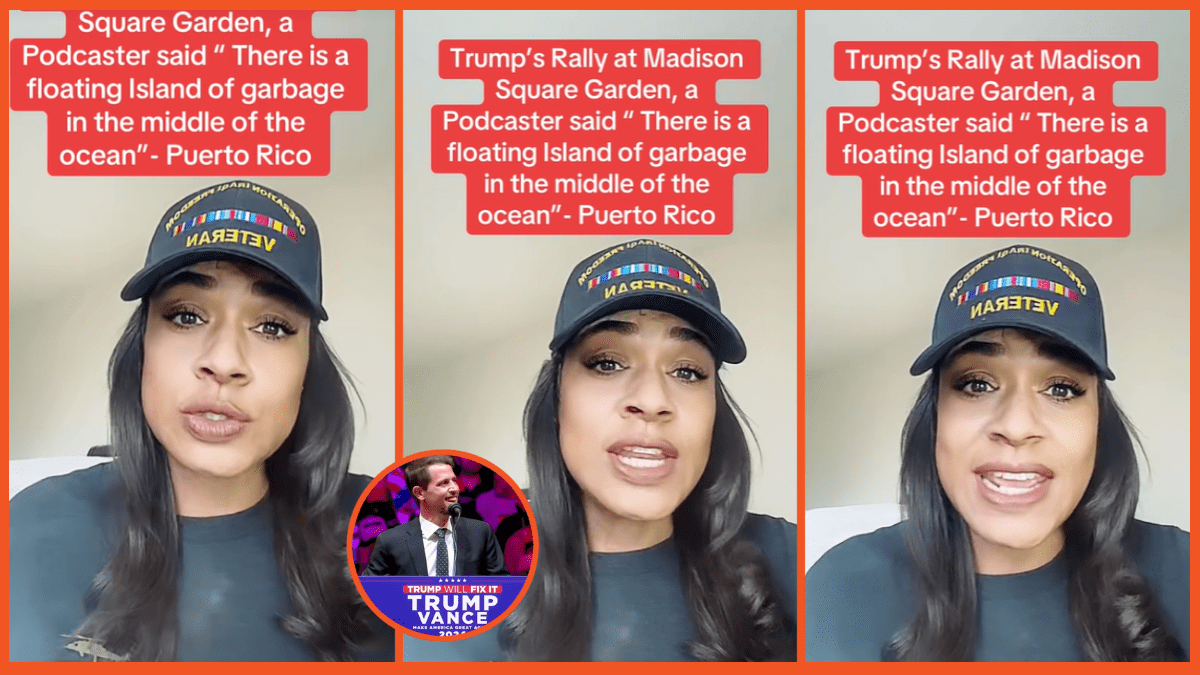Jess, going by jes_armygal on TikTok, a Puerto Rican woman who is also a U.S. Army veteran has some words to impart to the man who egregiously insulted her homeland and deflected criticism by labeling it as “humor.”
Tony Hinchcliffe’s opening act at Donald Trump’s Madison Square Garden rally was a masterclass in misjudging the joke. Even he seemed pleasantly surprised when the audience did not react negatively when he said: “I don’t know if you guys know this, but there’s literally a floating island of garbage in the middle of the ocean right now. I think it’s called Puerto Rico.”
While having a laugh together can unite people, Hinchcliffe’s pathetic excuse of a joke managed to ignite the ire of Puerto Rican Americans, many in the Latino community, not to mention everyone who has a balanced moral compass and empathy for fellow human beings regardless of where they hail from.
Hiding behind “comedy” like a child behind their mother’s skirts
Jess, like all Puerto Ricans, has the right to be “livid” upon hearing how Tony Hinchcliffe decided to describe the appropriately nicknamed “Isla del Encanto.” The veteran, like other outspoken voices, had to offer a timely reminder that Puerto Ricans are American, and have been since 1917, as the island has been part of the U.S. territory since the late 19th century.
Although they have many of the same rights as American citizens, Puerto Ricans residing in the archipelago cannot vote in the election. If they could, inviting Hinchcliffe to the MSG rally would have truly been the Trump campaign’s biggest blunder – some people already argue it is high on the list, considering there are about 300 thousand Puerto Rican voters in the swing state of Pennsylvania.
In the aftermath of the nasty comments, Jess, and other Puerto Ricans, were reminded of how then-President Trump treated Puerto Rico and its people in the aftermath of the 2017 hurricanes that devastated the Caribbean archipelago, for instance, how the billionaire fought against sending billions in monetary aid to the ravaged territory and its denizens.
JD Vance tried to defuse the controversial situation at a Wisconsin rally by downplaying the gravity of the Kill Tony podcast host’s words. Trump’s running mate claimed that he had not watched Tony Hinchcliffe’s performance, but he nevertheless said: “I’m not going to comment on the specifics of the joke, but I think that we have to stop getting so offended at every little thing in the United States of America. I’m so over it.”
Hinchcliffe himself had a similar line of self-defense when he took to X in the aftermath of his pathetic attempt at a joke and took no accountability whatsoever. “I love Puerto Rico,” he wrote, which is the metaphorical equivalent of telling one’s spouse you love them immediately after verbally assaulting them.
Historian Anne Applebaum wrote in an article the day after the vitriolic New York rally took place:
“It is not a joke, even when used by professional comedians. These insults are central to Trump’s message, which is why they were featured at a venue he reveres. They are also classic, authoritarian tactics that have worked before, not only in the 1930s but also in places such as modern Venezuela and modern Russia, countries where the public was also prepared over many years to accept lawlessness and violence from the state.”
As a general rule, I think that comedy shouldn’t be easily censored, and that stepping on the stage as a comedian allows one to stretch the bounds of what would normally be considered politically correct. Having said that, calling oneself a “comedian” does not give a free pass to spew crude, inflammatory, offensive, bigoted “jokes.”
It is most concerning that this kind of rhetoric is not an outlier but a symptom of a much larger problem. A problem that to the Trump campaign is no problem at all, but part of a polarizing, hate-fueled, fearmongering strategy that seeks to win him the presidency, the one thing it has become clear the Republican nominee truly cares about at the end of the day.
